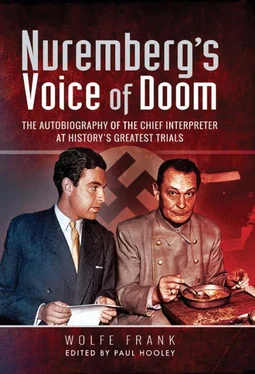Dimbleby: ‘Where, did you say, you’re doing this?’
Frank: ‘At Berkeley Square on the second floor.’
Dimbleby: ‘Thank you, Mr Frank,’ followed by ‘that was Wolfe Frank the Voice of Doom and Chief Interpreter at the next Nuremberg trial. And now, ladies and gentlemen, we have with us the most amazing flea circus ever to come out of Liechtenstein.’
Over sixty applicants flooded the offices in Berkeley Square during the next three days. Seven or eight never got a word out – they simply dried up at the crucial moment. Some produced every twentieth or thirtieth word. Others gave a translation that had nothing to do with the original text. However, I did manage to sign up the best people and fill the required number and I had somehow got together a very fine group of people including a deputy, Sigi Rammler, Austrian by birth, who succeeded me when I departed Nuremberg in November 1947, before the SP were over.
In the meantime, I found ways of improving my finances by covering the trials for the BBC and a programme called Radio Newsreel and the recordings of my broadcasts are amongst my Nuremberg souvenirs.

39. ‘THE EVIL THAT MEN DO LIVES AFTER THEM’ [1] William Shakespeare, Julius Caesar (Act 3, scene 2).
MY ASSOCIATION WITH THE BBC was very beneficial indeed. [2] Frank appeared twice-weekly on the Dispatches programme, Newsreel and on the German Service for the BBC and World Report for NBC.
My broadcasts from the courtroom during the SP were not exactly overpaid. I did some work for NBC, New York, later on, and earned as much per minute as BBC paid me for an entire interview; but I had a press card, a sticker saying ‘Press’ for my car, which did its job for at least four years afterwards, and BBC friends helped me legalise my car. I also did some broadcasts for the German Service in London and my many contacts with Goering et al. produced a lot of interesting material for them.
The SP trials proceeded more or less according to plan, but the German lawyers increasingly began to slow things down. They were sensing the estrangement between East and West and deduced, quite accurately as we now know, that a wind of change was taking place – or as Dr Aschenauer put it (see Prologue) – ‘A late verdict will mean a mild verdict.’ The judges in Nuremberg were still meting out death sentences but the US was hanging the mass-murdering Nazis not with relish but with reluctance.
Many of the subjects of our interrogations contained mundane and trivial matters but, as had happened during the IMT, there were some enormously dramatic moments. For sheer horrific content, the interrogations of Otto Ohlendorf, Chief of the Special Action Group in the East, were amongst the worst.
I was called into an interrogation on a Sunday afternoon, unexpectedly and without even knowing who Ohlendorf was or what he had been doing – but I soon learned. The unit he commanded was charged with combatting the resistance fighters in German-occupied Eastern Territories and the extermination of Jews. Ohlendorf admitted to it all quite freely. He was very much at his ease when he was brought into the room. His appearance was neat, he was well turned out and he was quite good-looking – one would have invited him home without hesitation. He was intelligent, alright, and we all stared at him in utter disbelief when he avowed, without hesitation, that he had ordered the ‘humane’ killing of some 90,000 people.
His pride and joy, he told us, had been the mobile gas chambers, which he then described in great detail. They were vans, disguised as transport vehicles, which were driven to the scene of the murders. There, the victims were asked to board. Ohlendorf’s claim to humanitarian fame, he felt, was his special system of loading and unloading these gas chambers in such a way that the victims never guessed what was awaiting them. Even more important, and this is where his listeners began to reel in horror, his staff were spared undue mental suffering. They had, so he explained, been very severely emotionally affected by the struggles and screams of the dying until he had designed his new solution for the ‘Final Solution’. [3] The Nazi plan to exterminate the Jewish people.
Nervous pressure upon his brave henchmen, he continued, had created serious personnel problems that he had had to remedy.
Under his new system the victims, he asserted, did not know where the vans were taking them. The mechanism for locking the doors was so designed that the passengers did not know that the doors were being made air-, or gas-tight. The vans were soundproof and his staff could not hear the noise of death. They could not look into the vans because the windows were too high, and they did not need to see if the Jews were dead since the time for Zyklon B to be fatal was known. At the proper moment, large fans were switched on and only when the last trace of the gas was gone would the doors be opened and the corpses unloaded. Care was always taken, he assured us, that the next victims in line could not see this happen.
The staggering aspect of this testimony was not so much the ghastly story, which had already become terribly familiar, but the manner in which Ohlendorf told it. He was, without doubt, proud of his work. He talked quietly, with expressive gestures of well-shaped hands, smoking our cigarettes, of the attacks on German occupation troops by Polish freedom fighters and the unreasonable time and effort required to dispose of the Jews at the same time. It was here, he felt, that his talents as an organiser and his ingenuity had served the Fatherland so well, and surely, he deserved everybody’s recognition – including ours?
Even now, over thirty years later, I remember vividly the frame of mind in which we, the listeners to his account, were leaving him late that evening. None of us could ever have imagined, until that day, such utter total lack of moral, ethical or human standards as we had witnessed. The man was proud, self-satisfied and mentally at peace. Unlike all the other murderers, the henchmen, the executioners, the sadists, the monsters I had encountered, he was searching for no explanation, no excuse, no justification, because he saw it all in his outstanding services, rendered to the cause. He did so to the end of his trial quietly, accurately and steadfastly, and I am certain he remained thus as he was walking up the steps to the gallows.
There were days, such as that, when after my day in court I could not eat and I had to drown myself in alcohol before I could sleep; days when my reactions to anything or anyone German were not normal.
These were inevitable emotional reactions. What has remained is the realisation that a lifetime is too short for such horrors to be filed away in the annals of history as something destined to be forgotten. Forgiven, perhaps – forgotten – never. I flinch at the sickening sentimentality that demands the release of a Rudolf Hess, the application of the statutes of limitation.
Editor:Wolfe’s interrogating of Otto Ohlendorf will have come during the Einsatzgruppen Trial, the ninth of the SP trials, which began on 29 September 1947 and tried Ohlendorf and twenty-three other officers of the Einsatzgruppen (SS Task Force), which was said, together with other units of the Security Police, to have murdered two million Jews.
Rudolf Aschenauer was Ohlendorf’s counsel and it was following his suggestion that his delaying tactics might mean ‘a mild verdict’ for his client, together with the court handing out seemingly softer sentences – coupled, no doubt, with thoughts of the horrific interviewing of Ohlendorf (referred to within this chapter) – that Wolfe Frank decided to retire from his position as Chief Interpreter.
Читать дальше













